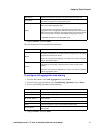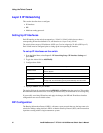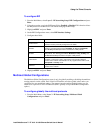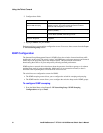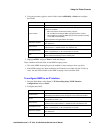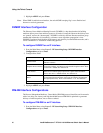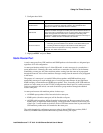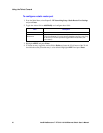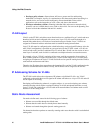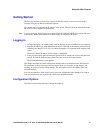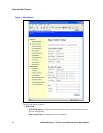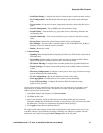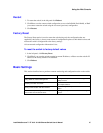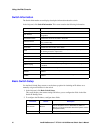
Intel® NetStructure™ ZT 8101 10/100 Ethernet Switch User’s Manual 89
Using the Web Console 5
The ZT 8101 switch has an embedded Web server that allows you to manage the switch from
anywhere on the network through a standard browser such as Netscape* Navigator or Microsoft*
Internet Explorer. The Web browser communicates directly with the switch using the HTTP
protocol.
The Web Console program and the Telnet Console are different ways to access the same internal
switching software and configure it. Thus, all settings found in the Web Console are the same as
those found in the Telnet Console.
Note: The Web Console does not accept Chinese language input (or other languages requiring 2 bytes per
character).
Before You Start
The ZT 8101 switch supports a wide array of functions and provides great flexibility and increased
network performance by eliminating the routing bottleneck between networks: the WAN, the
Internet, and the intranet. This new generation switch performs routing functions in hardware
rather than software. To take full advantage of this flexibility and rich feature set, you need to
carefully plan a deployment strategy that will maximize the potential of the ZT 8101 switch.
This plan should include a
• “General Deployment Strategy”
• “VLAN Layout”
• “IP Addressing Scheme for VLANs”
• “Static Route Assessment”
General Deployment Strategy
• Determine how to segment the network—This involves creating VLANs in an existing
Layer 2 switched network.
• Develop an IP addressing scheme—This involves allocating a block of IP addresses to each
network segment. Each network subnet is then assigned a network address and a subnet mask.
• Determine which network resources must be shared by the subnets and how they will be
shared—
You can connect shared resources directly to the Layer 3 switch, if need be. Or you
can set up static routes to make the shared resources accessible.
• Determine how each subnet will communicate with the WAN or Internet—Again, static
routes should be determined and default gateways identified.
• Develop a security scheme— Some subnets on the network need more security or should be
isolated from the other subnets. You can use MAC and IP filtering. You can also configure one
or more VLANs on the Layer 3 switch without an IP subnet. Without a subnet mask, these
VLANs function as a Layer 2 VLAN and require an external router to connect to the rest of the
network.



